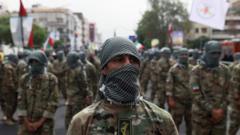Reports indicate a surge in Iran's efforts to target dissidents abroad, allegedly employing criminal gangs for assassination and kidnapping, despite vehement denials from Iranian officials. Notorious figures, such as Naji Sharifi Zindashti, are identified as key players in these plots, raising questions about the intertwining of organized crime and Iranian intelligence.
Iran's Covert Operations: Criminal Gangs Employed for Assassinations Abroad

Iran's Covert Operations: Criminal Gangs Employed for Assassinations Abroad
New intelligence reveals Iranian regime’s alarming links to criminal organizations for carrying out hits on dissidents and political enemies overseas.
Iran's regime is reportedly escalating its overseas operations targeting dissidents, journalists, and political adversaries by employing criminal gangs for assassinations and kidnappings, as illustrated in recent Western intelligence reports. These alarming claims suggest that Iranian authorities are increasingly outsourcing violent operations, despite their repeated denials.
Evidence from court documents in Turkey and the US suggests this activity has intensified significantly post-2022, with a range of targets including former officials from the US administration. The alleged involvement of Naji Sharifi Zindashti, a noted Iranian criminal boss linked to international drug trafficking, features prominently. Zindashti has been implicated in various criminal activities, including the high-profile assassination of Saeed Karimian, head of a Persian-language TV network, which Iranian authorities considered a threat to their ideological narrative.
Documents reveal that Zindashti’s networks may also be entangled with Iran's intelligence services. Investigative journalists assert that there’s a consistent pattern where criminal operatives connected with Zindashti appear at the scenes of killings of those deemed unfavorable by Tehran. The shadowy connection between organized crime and political assassinations has prompted concern about Iranian state-sponsored violence spilling over borders.
One significant incident tied to Zindashti was the reported conspiracy to eliminate two Iranian defectors in the US, a plot foiled by law enforcement before execution. Furthermore, the Iranian regime is believed to have employed various criminal gangs, including the notorious Thieves-in-Law from the former Soviet states, to execute these covert missions.
This pattern has extended into recent years, with a US jury convicting individuals affiliated with the Thieves-in-Law for plotting attacks against Iranian-American activists. The aftermath of the assassination of Quds Force commander General Qasem Soleimani has led Iran to allegedly seek revenge against those involved in his death, including key figures from the Trump administration.
The ongoing menace posed by these Iranian plots has incited the US and UK to impose sanctions on individuals suspected of engaging in these vile operations, including Zindashti. As threats continue to loom, UK domestic security officials report numerous credible threats impacting individuals linked to Iranian dissent. Analysis of prior attacks illustrates the ongoing dangers, highlighting the persistent Iranian strategy of utilizing third-party criminals to maintain plausible deniability for its political purges.
In summary, the Iranian regime appears to be deepening its reliance on criminal organizations to carry out violence abroad, potentially complicating international relations and prompting a robust response from security agencies in affected countries. The creep of Iranian influence through organized crime remains a pivotal issue for global security, requiring vigilant scrutiny and intervention from law enforcement agencies worldwide.




















